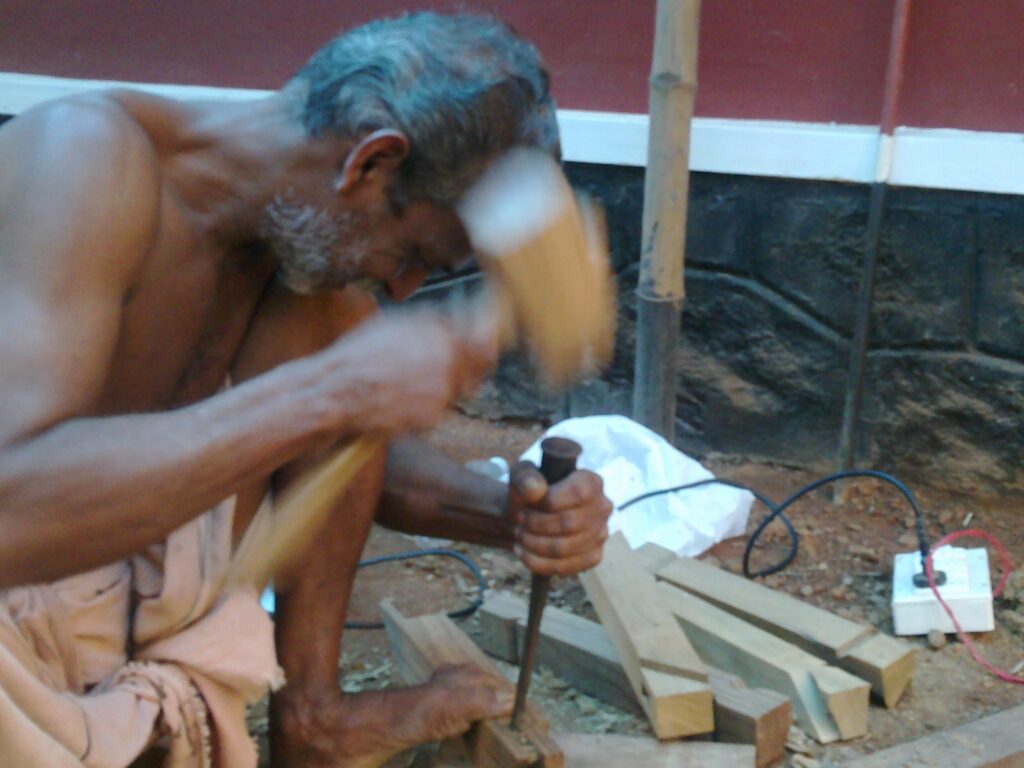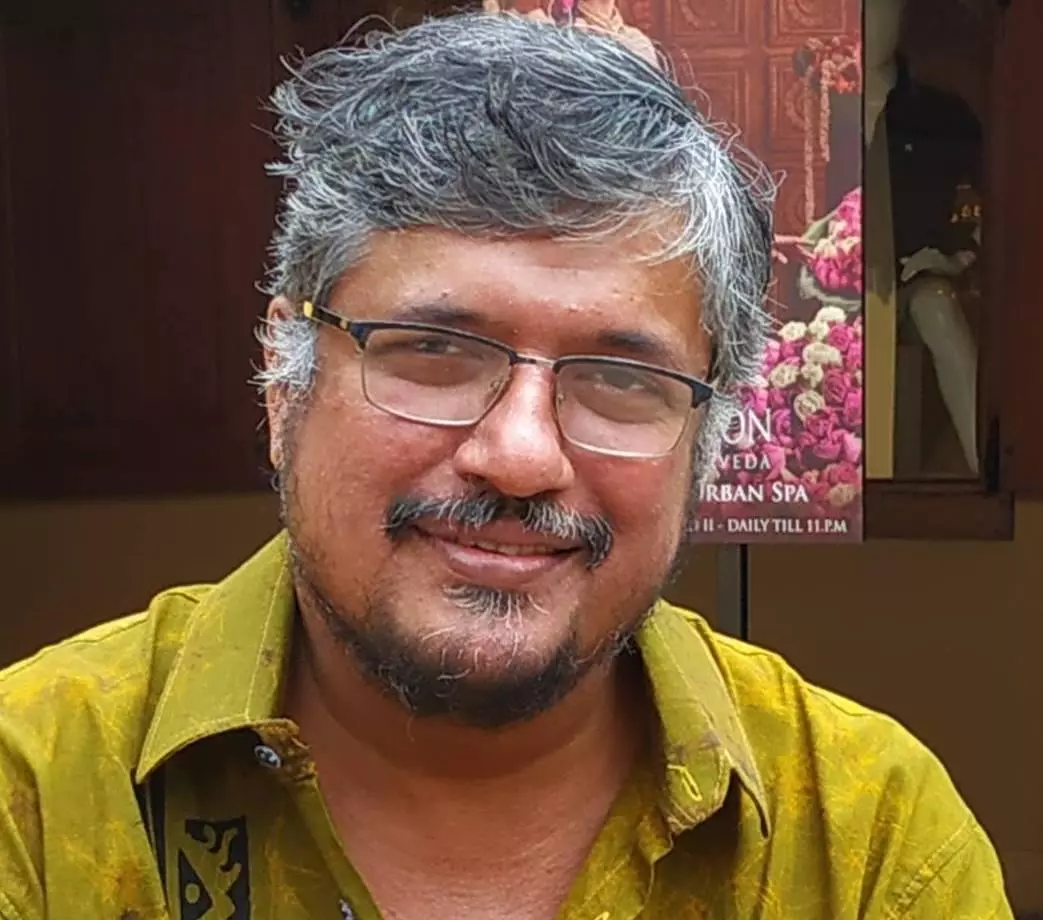
Slow by Design: Asari Defiance Against Colonial Modernity
In early 20th-century Kerala, the Asari (carpenter) caste resisted both colonial and Brahminical dominance by intentionally rejecting the opportunities provided by colonial institutions. They actively dissuaded community members from engaging with these institutions. Sunandan K.N. explores how this deliberate act of refusal shaped the Asari community’s understanding of progress and how Asaris in the early decades of the 20th century recognised the presence of a new time which was different in form and behavior from other times in the past. Politics of Ignoring: Stories of Asari Interventions in Colonial Practices in Malabar- Part 3
STRATEGIES OF IGNORING: COLONIALISM AS A VICIOUS TIME
If space was one of the important parameters through which Asaris avoided colonial invitations to the modernised work space, time was equally an important factor in this avoidance. Asaris in the early decades of the 20th century recognised the presence of a new time which was different in form and behavior from other times in the past. To understand how Asaris interacted with this new time, we have to first explore the Asari ways of engaging with time in general. Kalam was the general name that was used to represent different forms of time at different periods. The prayer quoted below, which is known to many Asaris even now, illustrates certain generalised notions of kalam as Asaris understood it.
Oh Kalabhairava
Didn’t you see that
A kalam with all its vicious intentions
Has captured me and leads me
Through paths which are not mine
Use your powers and help me
For escaping from its tightening embrace
I don’t know where it came from
I don’t know whether I deserve it
If I do, I don’t know
How many days it will continue
Please show mercy on me and
Send this vicious time
Far away from me.
Asaris especially recited this prayer in a ritual attempting to exorcise bad omens. Unlike the colonial notion of time, kalam was not an omnipresent phenomenon in which everything else was located. Nor did it progress in a linear path from the past through the present to the future. Kalam, while being a measure of duration, was also an object or a person-like entity that had its behavioral patterns and effects on other objects and individuals. Since it was an object-like entity, humans could interact with it, be located inside it, resist it, or just distance themselves from it. Since it was also a human-like entity, a powerful person could change the characteristics of a particular time for good or bad ends.
It was within this general notion of temporality that Asaris invoked the presence of a new time in the early decades of the 20th century. Kunjan, a carpenter in his eighties from Keralasseri in the southern part of Malabar, described the time of his childhood during the 1930s in a similar manner to several other old Asaris. According to Kunjan, ‘time is like an intelligent person who behaves in different manners with different people.’ His childhood was such a period when time was angry with all Asaris. ‘Evil forces were active everywhere. In that situation, one had to act carefully and cautiously.’

To my question about the form in which the evil forces manifested in that period, Kunjan answered that the evil forces acted mainly in the form of temptation to violate caste rules. As Kunjan’s grandfather knew the strategies to overcome the evil forces of time, they did not face any major catastrophe. According to Kunjan’s grandfather, the most important rule was that one should not travel to any unfamiliar places, especially out of desham, during kashtakalam (bad time). Kunjan’s story is an example that shows how Asaris understood the period when colonial intervention shook the fundamental structures of caste and asarippani.
In Asari Vrithantham, Neelakantan Achari explained the characteristics of the new time through the dialogue between Kandan, the father and Koman, the son. In their discussion about the desirability of travel, the son argued that travel was not against caste rules by pointing out the example of the great-grandfather who had moved from another desham to the present one. To this argument of his son, Kandan replied: One has to decide when and whether one should travel according to his time. The present is a difficult time for Asaris. Who will protect asarippani (carpentry work) other than Asaris? During difficult times, we have to stick to desham and pani (work) like a scared baby clinging to the chest of its mother. That should be the new prayer of Asaris to Chathan (one of the gods). If we travel out of the desham during an evil time, we will not come back (Achari 1936).
In this narration, we can glimpse a shadow of fear of the imminent threat to asarippani from some undisclosed sources. In this new circumstance of a bad time, Kandan saw the necessity of a new prayer for holding on to one’s desham and work. Asaris in my interviews only indirectly explained the colonial intervention as a reason for the bad time in their childhood, but Neelakantan Achari’s work quoted above has directly mentioned the nexus between the new and old thamburakkanmar (lords) as the evil force in the form of bad time. The Brahmins were the old lords and the white men were the new lords in this description. Achari, through his character Kandan, described the relation between the new and the old lords as intimidating and uncontrollable.
Earlier too, under the old thamburans (that is, the earlier generations of the landlords), we had had many instances of bad times. But our forefathers knew how to overcome those unkind forces, which were mostly otherworldly. When the old thamburan (naïve landlord) in desham met the new thamburan (the white man) from the town, the latter tempted the former with earthly pleasures, and he succumbed to this temptation. They together changed the world around us, and now we Asaris have ended up in the clutches of an evil time (Achari 1936).
Achari’s analysis of the contemporary forces of domination noted not just another period of bad time but a new variety of bad time, which was a result of the alliance between the colonialists and the Brahmins. In other words, time, like an individual, could behave in totally unprecedented ways, and one has to be creative in deciding strategies to overcome bad time. As we saw earlier, the first rule Kandan prescribed to his son was that of locating oneself in desham when one was under the influence of bad time. The second rule, which was equally important, was that one should slow down every activity, including asarippani.

You can see there is an urge in everyone and everywhere to rush towards fulfilling our desires. Asari, in order not to fall in this rush, has to bring time under his control. When there is doubt, he has to slow down, even though others may not appreciate it. If earlier, one had to touch the wood once to sense it, now he has to do twice to make sure; he should see twice and smell twice (Achari 1936). Achari here prescribed a slowing down of work, which was a strategy to oppose the colonial/missionary conception of work and industriousness. The Asaris’ ‘slowness’ was a very popular concept, especially among the upper castes for whom Asaris built houses or temples.
Many proverbs from the early decades of the 20th century criticised Asaris for their lazy attitude towards work. One proverb says that ‘if Asari is in, the Adharam (document of the property) is out’. The proverb means that if an Asari is working in a house, his work never ends until one has to pledge the document of the property to pay the expenses. Mention of the property document shows that the proverb emerged in the colonial period, where a property’s ownership was established by a document called Adharam. The proverb ‘It is like when you call the Asari for lunch’ is premised on the opinion that, generally, Asaris worked very slowly, and when they were called for lunch, they pretended that they were busy with their work. It is important to note that this concept of slowness of asarippani was a relatively new notion that emerged in the context of Asaris’ conflict with colonial notions of work and time.
In one of his early travel reports in 1889, Edgar Thurston described how he was surprised ‘by the coordination and swiftness’ of Asaris, who worked ‘without drawings or plans’. In Ponnani, he witnessed the construction of the roof of a house, which was completed in a day by a group of proficient carpenters in an orderly manner (Thurston 1906: 75). E. B. Havell considered carpenters’ efficient and hardworking. According to him, the way Asaris executed their work was ‘commendable for its precision, promptness and finish’ (Havell 1901: 37).
We should remember that the colonialists generally considered natives lazy people who did not know the value of time. Even in that context, Thurston and Havell described Asaris as prompt and hardworking. We may conclude that the so-called slowness/laziness of Asaris was not an ahistorical and essential characteristic of asarippani but a strategy in a particular context and period. The Asari concept of desham and (bad) time was part of the strategies through which Asaris avoided the colonial attempt of relocation and assimilation.
In other words, space and time were two of the important domains in which Asaris resisted colonial intervention in their practices of knowing.
(to be continued)
